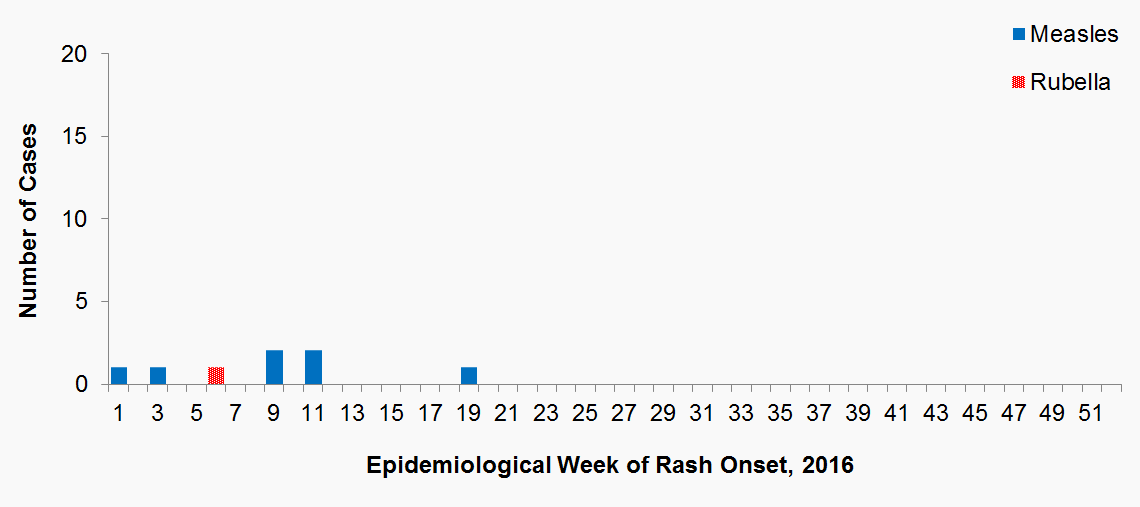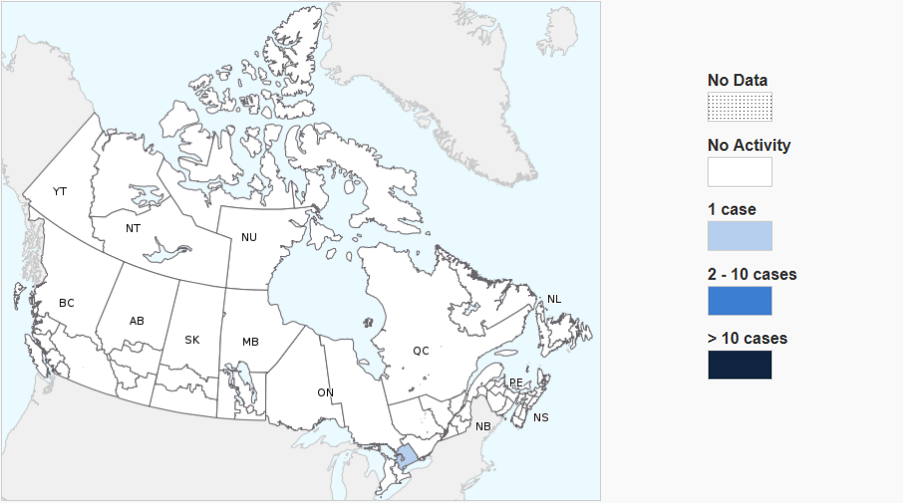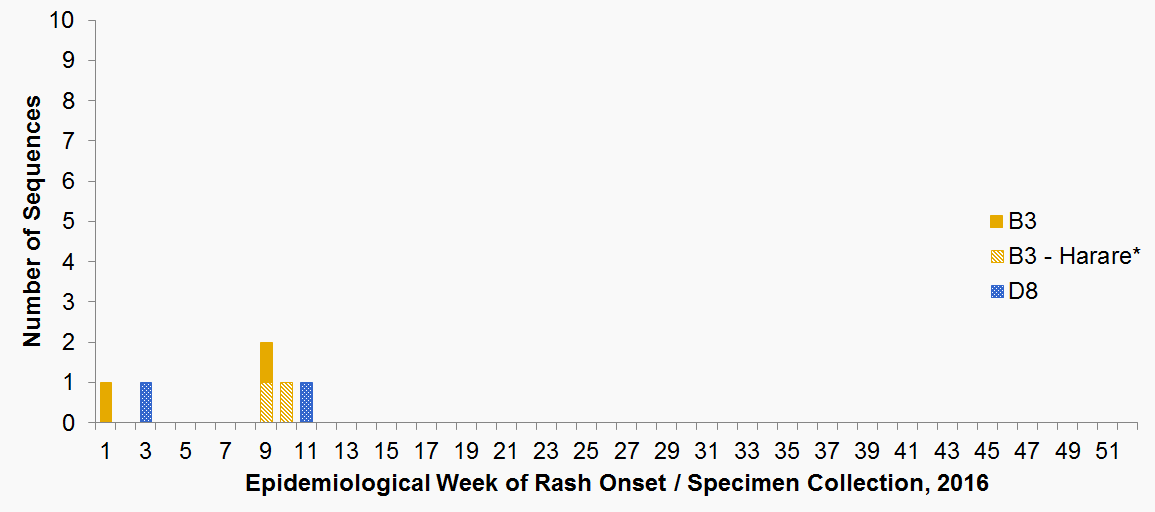Measles & Rubella Weekly Monitoring Report: May 8 to May 14, 2016 (week 19)
Key Points
- In Canada, one new case of measles was reported for week 19, 2016.
- One province, Ontario, has an active measles case.
- A total of 7 cases of measles, and 1 case of rubella have been reported in Canada in 2016.
On this page
Organization:
Epidemiological Summary
During epidemiological week 19, 2016, one new case of measles was reported by OntarioFootnote 1. Rash onset for this case occurred in week 19 and the investigation is still ongoing.
No cases of rubella were reported. It has been 13 epidemiological weeks since the last reported rubella case (week 06, 2016).
The year-to-date total is 7 cases of measles and 1 case of rubella for 2016 (Figure 1).
FIGURE 1: Number of cases of measles (n=7) and rubella (n=1), by week of rash onset, as reported to the Canadian Measles/ Rubella Surveillance System (CMRSS) and Measles and Rubella Surveillance system (MARS), for the period ending May 14, 2016.

Figure 1 - Text Description
| Epidemiological Week of Rash Onset, 2016 | Number of confirmed measles cases reported | Number of confirmed rubella cases reported |
|---|---|---|
| 1 | 1 | 0 |
| 2 | 0 | 0 |
| 3 | 1 | 0 |
| 4 | 0 | 0 |
| 5 | 0 | 0 |
| 6 | 0 | 1 |
| 7 | 0 | 0 |
| 8 | 0 | 0 |
| 9 | 2 | 0 |
| 10 | 0 | 0 |
| 11 | 2 | 0 |
| 12 | 0 | 0 |
| 13 | 0 | 0 |
| 14 | 0 | 0 |
| 15 | 0 | 0 |
| 16 | 0 | 0 |
| 17 | 0 | 0 |
| 18 | 0 | 0 |
| 19 | 1 | 0 |
| 20 | 0 | 0 |
| 21 | 0 | 0 |
| 22 | 0 | 0 |
| 23 | 0 | 0 |
| 24 | 0 | 0 |
| 25 | 0 | 0 |
| 26 | 0 | 0 |
| 27 | 0 | 0 |
| 28 | 0 | 0 |
| 29 | 0 | 0 |
| 30 | 0 | 0 |
| 31 | 0 | 0 |
| 32 | 0 | 0 |
| 33 | 0 | 0 |
| 34 | 0 | 0 |
| 35 | 0 | 0 |
| 36 | 0 | 0 |
| 37 | 0 | 0 |
| 38 | 0 | 0 |
| 39 | 0 | 0 |
| 40 | 0 | 0 |
| 41 | 0 | 0 |
| 42 | 0 | 0 |
| 43 | 0 | 0 |
| 44 | 0 | 0 |
| 45 | 0 | 0 |
| 46 | 0 | 0 |
| 47 | 0 | 0 |
| 48 | 0 | 0 |
| 49 | 0 | 0 |
| 50 | 0 | 0 |
| 51 | 0 | 0 |
| 52 | 0 | 0 |
| Missing Rash Onset | 0 | 0 |
| Cases (year-to-date) | 7 | 1 |
Geographic Distribution
There is currently one reported activeFigure 2 - Footnote * case of measles in Canada, reported in the Central East region of Ontario (Figure 2). There are no reported active cases of rubella in Canada (figure not shown).
To date in 2016, measles cases have been reported in three Canadian provinces (British Columbia, Alberta, and Ontario), and a rubella case has been reported in one province (British Columbia).
Figure 2: Distribution of activeFigure 2 - Footnote *, confirmed measles cases by health region.

- Figure 2 - Footnote *
-
Active cases or outbreaks are those in which the onset date of the most recent case/outbreak-associated case falls within 32 days of the issue date of this reportFootnote 2.
Figure 2 - Text Description
| Health Region | Measles Cases | Rubella Cases |
|---|---|---|
| Eastern Regional Integrated Health Authority | 0 | 0 |
| Central Regional Integrated Health Authority | 0 | 0 |
| Western Regional Integrated Health Authority | 0 | 0 |
| Labrador-Grenfell Regional Integrated Health Authority | 0 | 0 |
| Prince Edward Island | 0 | 0 |
| South Shore District Health Authority | 0 | 0 |
| South West Nova District Health Authority | 0 | 0 |
| Annapolis Valley District Health Authority | 0 | 0 |
| Colchester East Hants Health Authority | 0 | 0 |
| Cumberland Health Authority | 0 | 0 |
| Pictou County Health Authority | 0 | 0 |
| Guysborough Antigonish Strait Health Authority | 0 | 0 |
| Cape Breton District Health Authority | 0 | 0 |
| Capital District Health Authority | 0 | 0 |
| Zone 1 (NB) | 0 | 0 |
| Zone 2 (NB) | 0 | 0 |
| Zone 3 (NB) | 0 | 0 |
| Zone 4 (NB) | 0 | 0 |
| Zone 5 (NB) | 0 | 0 |
| Zone 6 (NB) | 0 | 0 |
| Zone 7 (NB) | 0 | 0 |
| Québec and Chaudières-Appalaches | 0 | 0 |
| Centre-du-Québec | 0 | 0 |
| Montréal and Laval | 0 | 0 |
| Ouest-du-Québec | 0 | 0 |
| Montérégie | 0 | 0 |
| Nord-Est | 0 | 0 |
| Ontario Central East | 1 | 0 |
| Ontario Central West | 0 | 0 |
| Ontario Eastern | 0 | 0 |
| Ontario North East | 0 | 0 |
| Ontario North West | 0 | 0 |
| Ontario South West | 0 | 0 |
| City of Toronto Health Unit | 0 | 0 |
| Winnipeg Regional Health Authority | 0 | 0 |
| Prairie Mountain Health | 0 | 0 |
| Interlake-Eastern Regional Health Authority | 0 | 0 |
| Northern Regional Health Authority | 0 | 0 |
| Southern Health | 0 | 0 |
| Saskatchewan South | 0 | 0 |
| Saskatchewan Central | 0 | 0 |
| Saskatchewan North | 0 | 0 |
| South Zone | 0 | 0 |
| Calgary Zone | 0 | 0 |
| Central Zone | 0 | 0 |
| Edmonton Zone | 0 | 0 |
| North Zone | 0 | 0 |
| British Columbia Interior | 0 | 0 |
| British Columbia Fraser | 0 | 0 |
| British Columbia Vancouver Coastal | 0 | 0 |
| British Columbia Vancouver Island | 0 | 0 |
| British Columbia Northern | 0 | 0 |
| Yukon | 0 | 0 |
| Northwest Territories | 0 | 0 |
| Nunavut | 0 | 0 |
|
||
Laboratory Summary
Measles
To date in 2016, 6 measles cases have been genotyped and the genotypes were B3 (n=4) and D8 (n=2) (Figure 3).
Figure 3: Distribution of measles genotypes detected in 2016 (n=6) by weekFigure 3 - Footnote † of rash onset (if available, n=6) or specimen collection (n=0).

- Figure 3 - Footnote †
-
Epidemiological weeks for laboratory specimens are assigned in accordance with WHO guidelines (WHO.WER.2012;9(87):73) with week 1 beginning on the first Monday of the year.
- Figure 3 - Footnote *
-
Genotype B3 sequences identical to sequence variant / named strain MVi/Harare.ZWE/38.09 (GenBank accession number JF973033)
Figure 3 - Text Description
| Epi week | B3 | B3 - HarareFigure 3 Table - Footnote * | D4 | D8 | D8 - Taunton | D9 | H1 | Total |
|---|---|---|---|---|---|---|---|---|
| 1 | 1 | 0 | 0 | 0 | 0 | 0 | 0 | 1 |
| 2 | 0 | 0 | 0 | 0 | 0 | 0 | 0 | 0 |
| 3 | 0 | 0 | 0 | 1 | 0 | 0 | 0 | 1 |
| 4 | 0 | 0 | 0 | 0 | 0 | 0 | 0 | 0 |
| 5 | 0 | 0 | 0 | 0 | 0 | 0 | 0 | 0 |
| 6 | 0 | 0 | 0 | 0 | 0 | 0 | 0 | 0 |
| 7 | 0 | 0 | 0 | 0 | 0 | 0 | 0 | 0 |
| 8 | 0 | 0 | 0 | 0 | 0 | 0 | 0 | 0 |
| 9 | 1 | 1 | 0 | 0 | 0 | 0 | 0 | 2 |
| 10 | 0 | 1 | 0 | 0 | 0 | 0 | 0 | 1 |
| 11 | 0 | 0 | 0 | 1 | 0 | 0 | 0 | 1 |
| 12 | 0 | 0 | 0 | 0 | 0 | 0 | 0 | 0 |
| 13 | 0 | 0 | 0 | 0 | 0 | 0 | 0 | 0 |
| 14 | 0 | 0 | 0 | 0 | 0 | 0 | 0 | 0 |
| 15 | 0 | 0 | 0 | 0 | 0 | 0 | 0 | 0 |
| 16 | 0 | 0 | 0 | 0 | 0 | 0 | 0 | 0 |
| 17 | 0 | 0 | 0 | 0 | 0 | 0 | 0 | 0 |
| 18 | 0 | 0 | 0 | 0 | 0 | 0 | 0 | 0 |
| 19 | 0 | 0 | 0 | 0 | 0 | 0 | 0 | 0 |
| 20 | 0 | 0 | 0 | 0 | 0 | 0 | 0 | 0 |
| 21 | 0 | 0 | 0 | 0 | 0 | 0 | 0 | 0 |
| 22 | 0 | 0 | 0 | 0 | 0 | 0 | 0 | 0 |
| 23 | 0 | 0 | 0 | 0 | 0 | 0 | 0 | 0 |
| 24 | 0 | 0 | 0 | 0 | 0 | 0 | 0 | 0 |
| 25 | 0 | 0 | 0 | 0 | 0 | 0 | 0 | 0 |
| 26 | 0 | 0 | 0 | 0 | 0 | 0 | 0 | 0 |
| 27 | 0 | 0 | 0 | 0 | 0 | 0 | 0 | 0 |
| 28 | 0 | 0 | 0 | 0 | 0 | 0 | 0 | 0 |
| 29 | 0 | 0 | 0 | 0 | 0 | 0 | 0 | 0 |
| 30 | 0 | 0 | 0 | 0 | 0 | 0 | 0 | 0 |
| 31 | 0 | 0 | 0 | 0 | 0 | 0 | 0 | 0 |
| 32 | 0 | 0 | 0 | 0 | 0 | 0 | 0 | 0 |
| 33 | 0 | 0 | 0 | 0 | 0 | 0 | 0 | 0 |
| 34 | 0 | 0 | 0 | 0 | 0 | 0 | 0 | 0 |
| 35 | 0 | 0 | 0 | 0 | 0 | 0 | 0 | 0 |
| 36 | 0 | 0 | 0 | 0 | 0 | 0 | 0 | 0 |
| 37 | 0 | 0 | 0 | 0 | 0 | 0 | 0 | 0 |
| 38 | 0 | 0 | 0 | 0 | 0 | 0 | 0 | 0 |
| 39 | 0 | 0 | 0 | 0 | 0 | 0 | 0 | 0 |
| 40 | 0 | 0 | 0 | 0 | 0 | 0 | 0 | 0 |
| 41 | 0 | 0 | 0 | 0 | 0 | 0 | 0 | 0 |
| 42 | 0 | 0 | 0 | 0 | 0 | 0 | 0 | 0 |
| 43 | 0 | 0 | 0 | 0 | 0 | 0 | 0 | 0 |
| 44 | 0 | 0 | 0 | 0 | 0 | 0 | 0 | 0 |
| 45 | 0 | 0 | 0 | 0 | 0 | 0 | 0 | 0 |
| 46 | 0 | 0 | 0 | 0 | 0 | 0 | 0 | 0 |
| 47 | 0 | 0 | 0 | 0 | 0 | 0 | 0 | 0 |
| 48 | 0 | 0 | 0 | 0 | 0 | 0 | 0 | 0 |
| 49 | 0 | 0 | 0 | 0 | 0 | 0 | 0 | 0 |
| 50 | 0 | 0 | 0 | 0 | 0 | 0 | 0 | 0 |
| 51 | 0 | 0 | 0 | 0 | 0 | 0 | 0 | 0 |
| 52 | 0 | 0 | 0 | 0 | 0 | 0 | 0 | 0 |
| Total | 2 | 2 | 0 | 2 | 0 | 0 | 0 | 6 |
|
||||||||
The current global distribution of measles genotypes can be found on the WHO Measles Surveillance website.
For information regarding the interpretation and use of measles genotyping (including a discussion of genotypes and sequence variants), refer to Hiebert J and Severini A. Canada Communicable Disease Report. 2014; 40-12: 257- 260.
Rubella
No genotype information is available for the rubella case reported in 2016.